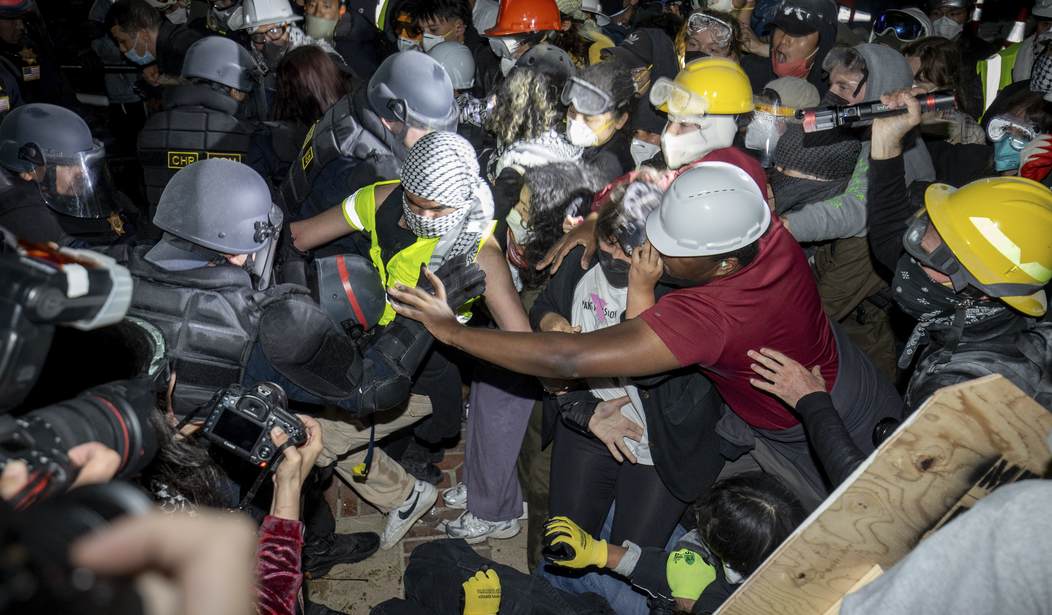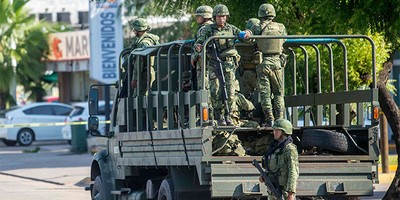As we approach the anniversary of the October 7 terrorist attacks that Hamas perpetrated against Israel, pro-Hamas agitators have been protesting around the country. Such protests are popular on college campuses, especially at the University of California, Los Angeles. To add insult to injury, UCLA last semester shut down a pro-Israel lecture by Robert Spencer. Young America's Foundation (YAF) is now fighting back with a free speech lawsuit filed on Thursday.
YAF Sues UCLA For Unconstitutional Treatment of Conservative Students While Allowing Pro-Hamas Encampment https://t.co/LN30cM7TJc
— YAF (@yaf) October 4, 2024
Mountain States Legal Foundation (MSLF) also posted Friday that they are joining in on the lawsuit.
"UCLA allowed its campus to be taken over by a radical anti-Israel mob, claiming that it could not do anything because the mob had a right to free speech (never mind the violence and property destruction)," James Kerwin, senior counsel at Mountain States Legal Foundation, said about the lawsuit.
BREAKING: We have partnered with @yaf to file a new lawsuit against UCLA for First Amendment violations. Free speech is a fundamental right for ALL Americans and that includes college students! YAF had a pro-Israel event shut down by UCLA while pro-Hamas mobs were allowed to run… pic.twitter.com/D7Pe3bkK5d
— Mountain States Legal Foundation (@MSLF) October 4, 2024
UCLA administrators hid behind "security concerns" to block the university's YAF chapter from hosting a lecture by Robert Spencer on "Everything You Know About Palestine Is Wrong."
The lawsuit details issues such as a lack of timely communication between the university and YAF organizers, despite the students' numerous attempts to ensure their event was able to take place.
When Spencer's move was canceled at the last minute, anti-Israel activists celebrated such a move.
The lawsuit also takes issue with UCLA caving to pro-Hamas agitators on campus, noting that "UCLA was purportedly concerned with the possibility of illegal or violent conduct by counter-protestors seeking to shout down and disrupt conservative, pro-Israel speakers on campus. But giving in to the demands of potentially violent and disruptive counter protestors is not a way to prevent violence or to enhance campus security—indeed, giving in would have exactly the opposite effect by encouraging more of the same in the future."
Recommended
YAF, Brooke Broll, and Macy Roepke are thus suing UCLA Chancellor Gene D. Block, former Executive Vice Chancellor Darnell Hunt, Associate Vice Chancellor Rick Braziel, and others from campus leadership. YAF charges that those involved "engaged in viewpoint discrimination by allowing anti-Israel events while shutting down pro-Israel speakers."
"Our higher education institutions are tasked with fostering debate, yet UCLA officials clearly violated this fundamental principle. By choosing sides, institutional leaders curtailed students’ intellectual growth and infringed upon our first amendment rights," Broll said.
UCLA is in a position where they must remain neutral, something that the lawsuit pointed out they clearly have not done. "These UCLA administrators violated the YAF students’ rights and failed to prevent a heckler’s veto by caving to pro-Hamas agitators. As a public school run with taxpayer dollars, UCLA must remain viewpoint-neutral and is prohibited from picking winners and losers when it comes to free expression," YAF also reminded.
The lawsuit seeks a preliminary and permanent injunction prohibiting UCLA from engaging in such viewpoint discrimination or a "heckler's veto" and is asking that security be provided equally regardless of the content of the speech. The lawsuit also seeks a declaratory judgment that UCLA violated the First Amendment. Further, the lawsuit seeks compensatory and nominal damages along with punitive damages and attorney fees.
Such bias has been part of a larger pattern. "Confirming the school’s institutional bias against Israel, UCLA sanctioned a violent encampment in the center of campus in the wake of Hamas terrorists’ October 7 massacre by issuing a stand-down order to law enforcement. UCLA's demonstrated pattern of deference to the anti-Israel mob was continued with its administrators' decision to deny YAF’s pro-Israel lecture with Robert Spencer," YAF also mentioned.
In speaking out against UCLA's cancelation of the event called out the university for the anti-Israel, pro-Hamas chaos on campus [Emphasis original]:
At the same time UCLA was complicit in the widespread violation of students’ rights and in other criminal and abusive conduct by anti-Israel activists, it was doing everything it could to derail Plaintiffs’ proposed pro-Israel lecture planned to take place in mid-May 2024 under controlled conditions in the Student Union. UCLA repeatedly ignored requests for information, withheld paperwork approvals, prevented Plaintiffs from effectively advertising in advance of the event, and engaged in other bureaucratic delay tactics.
When that did not work, UCLA resorted to less subtle forms of censorship. At the very last minute, just before the lecture was scheduled to take place, UCLA pulled a fast one: locking the doors to the event space, and claiming that the talk needed to be moved to an out-of-the way location because of purported security concerns arising from threatened counter-protest activity.
But UCLA should have anticipated the possibility of counter protests for days if not weeks, and cannot possibly claim to have been taken by surprise. In fact, it did anticipate this possibility, as administrators had expressly withheld approval for the event weeks before because of the mob. Indeed, the activists threatening to counter protest were the same ones who had recently established an unlawful encampment that UCLA had facilitated. UCLA cannot, of course, reasonably claim that it needed to handicap Plaintiff’s pro-Israel event at the last second due to an emerging threat from protestors who UCLA itself had emboldened by its extreme passivity (not to mention its active complicity) only days before.
In reality, UCLA’s last minute switch was simply a continuation of what it had already been doing: taking an extremely fastidious approach to one side of the debate (the pro-Israel side) and playing so “hands off” with respect to the other side that the campus was descending into spirals of vandalism and violence. Defendants imposed this double standard because they disagree with Plaintiffs’ pro-Israel message. In so doing, they engaged in viewpoint discrimination in violation of the First Amendment to the United States Constitution. Defendants also violated the First Amendment for the independent reason that when they locked the lecture hall doors and tried to move Plaintiffs’ event to an out-of-the-way venue, they gave official government sanction to a potential campus “shout down” mob that set out to prevent Plaintiffs from having their say in public.
Even if one could reasonably believe that UCLA officials were neutral on the question of Israel (which, to be clear, they were not), they still violated the First Amendment by taking the easy way out when the mob threatened to cancel Plaintiffs’ speech—choosing not to enforce laws against disruptive and potentially violent “shout down” tactics, but instead choosing to silence Plaintiffs, the target of the mob’s threats.
Compounding these constitutional violations, UCLA’s actions were taken pursuant to policies that give the university unbridled discretion to determine a number of factors crucial to the success or failure of a speaking event, such as the number participants allowed to attend, the location of the speech, its timing, and pre-event publicity. Because those policies fail to meaningfully guide UCLA administrators’ decisions, they are facially overbroad and unconstitutional.
A quote from former Gov. Scott Walker (R-WI), the president of YAF, slams cancel culture as well as calls to mind the importance of free speech. "Cancel culture has gone unchecked for far too long. YAF’s lawsuit aims to rebalance the equation, ensuring universities don't cave to unhinged mobs by canceling pro-Israel speakers and instead protect them and their First Amendment rights," he said.
Townhall previously covered the pro-Hamas sentiments that were allowed to rage on campus last year, including checkpoints and rampant racism, with violence even erupting and causing chaos to do with an anti-Israel encampment:
As the lawsuit further explained about the university's response:
Despite the illegality of the encampment, Defendants did nothing to remove it or to hold those responsible to account.
On the contrary, Defendants, including specifically Defendant Block, shamefully instructed UCLAPD to “stand down,” and not to interfere with the activists.
Worse still, UCLA security actually facilitated the activists in achieving their goals. Shortly after the encampment was established and as activists sought to carve out as wide an “exclusion zone” as possible, rather than immediately pushing back and preventing the unlawful takeover of a portion of the UCLA campus, UCLA security helped the activists establish a “border” to keep non-activists out by setting up metal bicycle racks as barricades around the encampment.
In other words, Defendants facilitated the acquisition of “territory” by the activists.
UCLA publicly justified its extreme passivity toward (and indeed participation in) the illegal encampment by reference to its purported commitment to “free speech.”
In reality, UCLA knew that the activists were operating very far beyond the outer limits of permissible speech, and were engaging in widespread violations of campus rules, state laws, and criminal statutes. UCLA’s passivity was not borne out of a commitment to free speech principles, it instead represented agreement with the point of view held by the anti-Israel activists.
Around May 1, 2024, after negative press reports concerning the encampment became too intense to ignore, Defendants finally sought the help of the Los Angeles Police Department. The encampment was cleared as of May 2, 2024.
Last December, UCLA was ranked by Brandeis University as one of those schools having the "highest antisemitic hostility," putting them in the top 25 of most antisemitic schools out of 51 colleges in the United States included on the list.
Meanwhile, pro-Hamas agitators still continue to speak out against Israel and are given a platform to do so. Also on Thursday, the Daily Bruin published an op-ed from Dylan Kush, an "organizer with Graduate Students for Justice in Palestine" who "was an organizer for UCLA Palestine solidarity encampment and other actions."
Not only did the op-ed, titled "Admin complacency in attacks on pro-Palestine protesters proves UCLA wants us dead," take issue with the university which has already caved to the mob, Kush also used the term "Zionist" and "Zionist mob attack" several times, seemingly as a dirty word.
"No repressive policy, mob attacks or Zionist violence will stop the student movement for Palestinian liberation. We aren’t afraid, and we will resist," his op-ed concluded.
Later this month, YAF is scheduled to bring Ben Shapiro to campus, which will again test how committed UCLA is to free speech.

























Join the conversation as a VIP Member